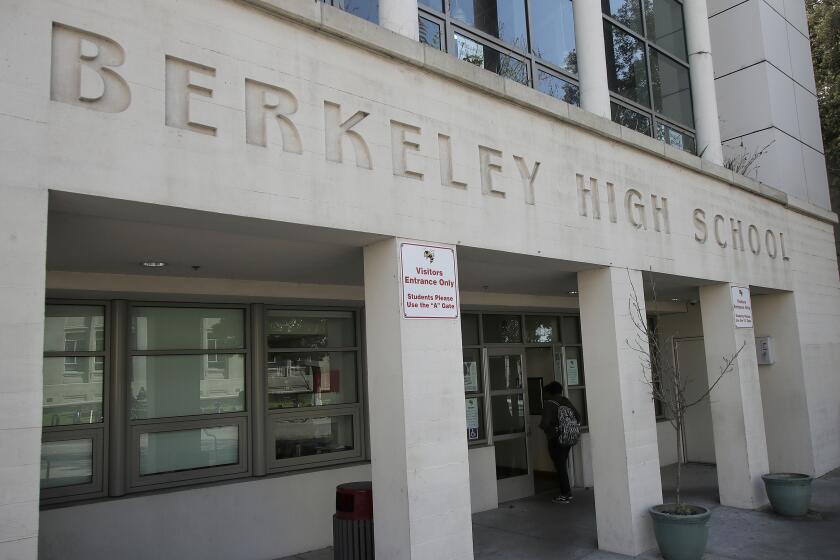Mayor drops school fight
Mayor Antonio Villaraigosa has abandoned efforts to gain direct legal authority over the Los Angeles Unified School District, converting a political and legal quagmire into what he calls a victory for all.
At a Friday morning news conference, Villaraigosa said he won’t appeal a court ruling nullifying a law that would have given him substantial authority over the nation’s second-largest school system.
The announcement came three days after two candidates the mayor backed won election to the Board of Education, giving him a 4-3 majority of close allies. His decision effectively ends a yearlong struggle over control of the district.
For the most part, Villaraigosa lost that battle: He won’t get the outright authority he once sought, like that enjoyed by the mayors of Boston, New York, Chicago and other cities. And his negotiated power-sharing plan has now died in litigation. But his plan to elect a new school board majority has mostly succeeded -- and that, for now, is enough, Villaraigosa apparently decided.
“This has been a tough and contentious year,” he said. “We’ve had debates. We’ve had arguments. We’ve been to the Legislature. We’ve been to the courts. We’ve been to the ballot box. We’ve enjoyed victories large and small, and we’ve shared more than our share of defeats.... It’s time for each and every one of us to pick up the oar, get in the boat and start rowing in the same direction.”
As for the court case, “it’s time to get out of the courtroom and into the classroom,” the mayor said.
Villaraigosa paid for his part in the litigation -- and the battle for control -- mostly through fundraising; the school district spent hundreds of thousands of dollars in public money opposing him.
The mayor should reimburse the district, said outgoing board member David Tokofsky, who was in Sacramento on Friday.
Tokofsky, a three-term incumbent, declined to run for reelection; the mayor supported Yolie Flores Aguilar, who won the seat in March.
Villaraigosa made his announcement at the new Miguel Contreras Learning Complex west of downtown. With him were the incoming board members he helped elect, the incumbent who had supported his efforts and two incumbents who had opposed them.
One of those two, board President Marlene Canter, stood to the mayor’s right. To his left was the other, Julie Korenstein. They were among targets of Villaraigosa’s ire when he called board members enemies of reform and defenders of the status quo.
On Friday, the mayor spoke instead of common goals: small, safe and clean schools; a rigorous curriculum; parent involvement; increased input for teachers.
Schools Supt. David L. Brewer, six months into the job, also had an announcement, saying he would set up a parent and community engagement division. The district’s parent-involvement efforts have been a frequent source of criticism in past audits of L.A. Unified. Brewer’s plan envisions broader community participation, tapping into civic resources and philanthropic wealth to benefit schools.
“We need systemic change,” he said, “but, more important, we need partnerships.... No urban school district in this country” has solved the kind of problems that persist in L.A. Unified.
Politically, “the timing was right” for Villaraigosa’s move, said Raphael Sonenshein, a professor of political science at Cal State Fullerton. “It’s much better to give up the lawsuit, having won in the school board elections, than in the absence of this victory. It’s always good to give up on something when you have something better in hand.”
That “something better” is an allied board majority likely to give Villaraigosa a voice in broad district policy, something that he lacked even in the overturned law.
But Villaraigosa, as mayor, will remain outside district governance, a primary goal both of the previous school board and its allies in litigation, including the California School Boards Assn. and the California League of Women Voters.
“The mayor is doing what we hoped he would always do: bond with the district and create a partnership where he’s helping to bring in resources and address the needs of real kids in schools,” said Scott Plotkin, executive director of the school boards group.
“I have never doubted the mayor’s passion for the subject. I have regretted that he pursued it by trying to take over the school district. I will grudgingly admit that he put a spotlight on issues we adults should be talking about, and I’m grateful to him for that,” Plotkin said.
The nullified law did its main work, Villaraigosa said: “Make no mistake -- it was this bill that provided a framework for dialogue.”
The law, which he and political allies pushed through the Legislature, gave him the right to ratify the hiring or firing of the superintendent through a council of area mayors that he would dominate. The council was formulated because L.A. Unified includes all or parts of more than two dozen cities. But this provision, like others, was complex and inconsistent. For example, one group of mayors, but not all of them, had the added right to ratify the top administrator at their local schools.
Other provisions transferred much authority from the school board to the superintendent. But in a compromise with unions, collective bargaining would have remained under the board -- allowing unions to pressure board members for favorable contracts and improved working conditions.
Villaraigosa himself would have overseen three low-performing high schools and the elementary and middle schools that feed into them. But without the district’s willing cooperation, critics said, this district-within-a-district could have been more a source of conflict than reform.
The state courts found little to like but focused primarily on constitutional provisions separating cities and school districts. Although Villaraigosa could have appealed to the state Supreme Court, some legal experts said the law’s prospects looked dim.
Giving up on the law also essentially takes the mayor off the hook for student achievement. And the new board will be spared pressure to drop a legal argument that defeated him in court.
By this point, there seemingly weren’t many outside the mayor’s office who wanted the law. Among Villaraigosa’s frequent allies, billionaire philanthropist Eli Broad thought it a regressive substitute for actual mayoral authority; former Mayor Richard Riordan fretted that too much was being given to unions; and members of the teachers union voted against it, even though their leaders had helped craft it.
United Teachers Los Angeles ultimately opposed the mayor’s favored candidates in two board elections. But Friday, at least, union President A.J. Duffy -- who has known Villaraigosa for 20 years -- was in the mayor’s good graces and prominent in the group photo op.
The union had previously jousted with Riordan -- who won a majority of board members he supported in 1999, then lost it four years later to candidates he considered too close to UTLA.
Canter, the board president, said that all parties share a desire for reform but that the mayor’s preoccupation with control hampered collaboration that should be further along. “I want to work together on what they want to do,” she said in an interview. “It’s where and what and how. Let’s do it.”
The show of unity obscured a backdoor debate among district officials on whether the hastily called gathering violated the law prohibiting a meeting of a board majority without proper advance notice. In internal e-mails, legal counsel expressed concern, suggesting that at least one board member leave when the others were present. That advice was ignored.
Some tough questions were sidestepped as well, such as Villaraigosa’s position on the future role of charter schools or whether he would push this board for an authoritative role at a group of schools, as the rejected law had set out.
“I’m not going to sweat those details this morning,” he said.
More to Read
Start your day right
Sign up for Essential California for news, features and recommendations from the L.A. Times and beyond in your inbox six days a week.
You may occasionally receive promotional content from the Los Angeles Times.







